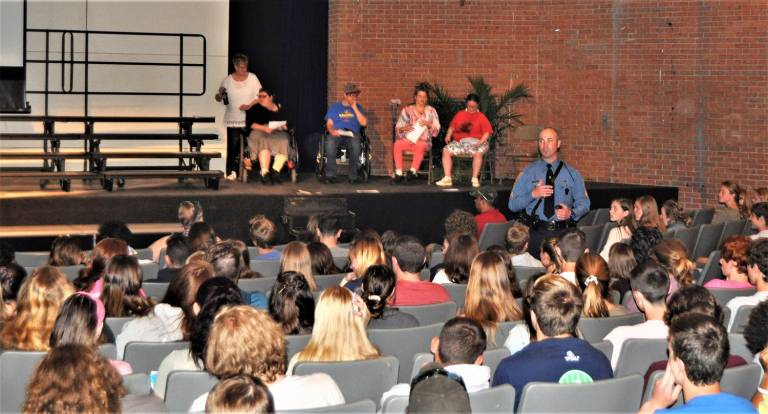Students hear teen driving stats

Kittatinny Regional High School hosted a special presentation organized by New Jersey State Police Officer Trooper Bambara in coordination with Progressive Health. Progressive Health cares for individuals with Traumatic Brain Injury (TBI).
Trooper Bambara started with statistics regarding teenage driving and car accidents:
• Number one cause of death in fifteen to twenty-four year olds.
• Ninety percent of teenage accidents are caused by driver error.
• About sixty percent of the driver error is due to a distraction.
• One teen fatality happens every week in New Jersey.
• Fatal crash of drivers sixteen to nineteen are four times greater than older teens.
He went onto to explain some of the reasons teen accidents are more likely to occur:
• Overconfident.
• Failing to buckle.
• Speeding (42% of fatal teen accidents).
• Impaired.
• Passenger distraction.
• Driving at night.
• Failing to anticipate hazards.
• Ignoring car maintenance.
Some interesting information:
• From 30 miles an hour or higher, you will be injured in a vehicle accident.
• In an accident everything is in motion: body, internal organs, also, anything in the car becomes a projectile.
• In many vehicles, you must wear your seatbelt in order for the airbags to deploy.
Next, individuals from Progressive Health shared their personal stories of how their lives changed in an instant.
• Steve was 17 years old when he fell asleep at the wheel of his car.
• Justin flipped his Ford Explorer at age twenty-one while driving intoxicated.
• Tara decided to drag race and hit a Fed Ex truck head on while trying to pass her opponent.
• At age 17, Michelle was broadsided by another car while making a left hand turn.
• Jana was 16 years old and distracted the driver of the car she was riding in. They collided with a bus. The bus driver was killed in this incident.
• Paul was only `5 when he was hit by a car when crossing the street in a cross walk. The driver had dropped his sandwich and was searching for it, when he struck Paul.
Each individual explained how the traumatic brain injury (TBI) has affected their lives. Some have short term memory loss while others repeat themselves. Some had to relearn skills like speaking and walking. Others will always require assistance. These very special individuals hope that by sharing this traumatic moment in their life they will remind others to consider their choices. “We are the message.” Think of us each time you turn the key or choose to be a passenger in someone’s vehicle.